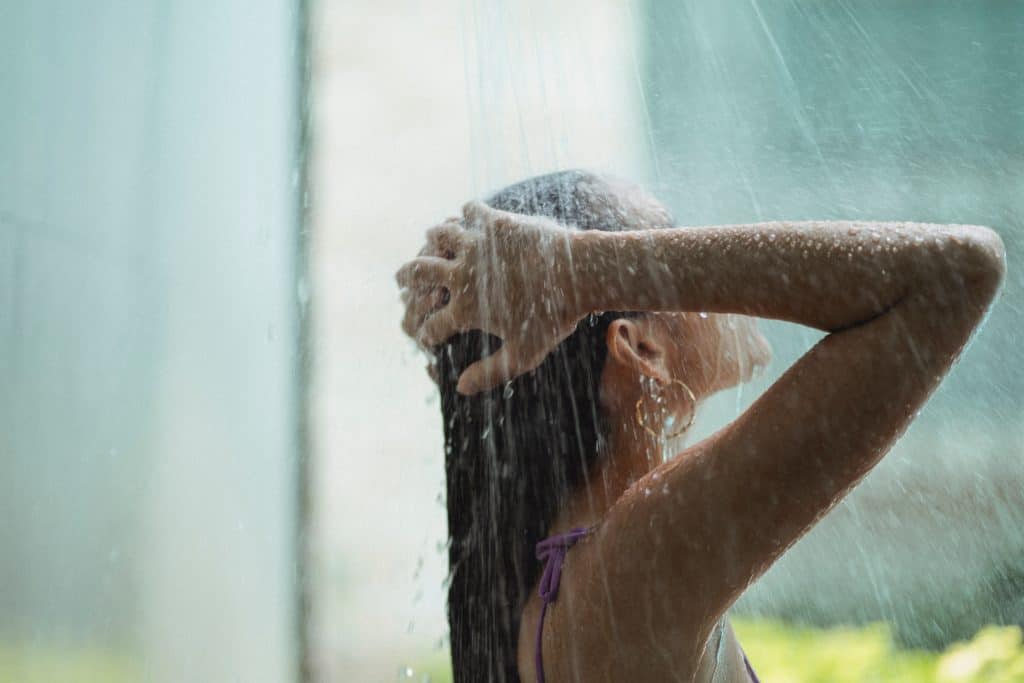Co-Wash vs Shampoo – Why you Should for Curly Hair
Co-Wash vs Shampoo for Curly Hair – Why you Should
Guest post especially prepared and written by Anna at Curl the Blessing
Co-Wash vs. Shampoo: The Do’s and Don’ts for Curly Hair
When it comes to caring for curly hair, there are numerous methods and products available. One of the most debated topics in the curly hair community is the choice between co-washing and traditional shampooing.
Both methods have their merits and drawbacks, and the best choice depends on your hair type, lifestyle, and personal preferences.
Here, we’ll delve into the world of co-washing and traditional shampooing, exploring their benefits, drawbacks, and which might be better suited for those with curly locks.
What is Co-Washing?
Co-washing, short for “conditioner washing,” is a hair care method that has gained immense popularity in recent years, particularly among individuals with curly hair.
This approach offers a gentler alternative to traditional shampooing and is specifically well-suited for those seeking to maintain the moisture and natural beauty of their curly locks.
In this section, we’ll explore the concept of co-washing in the context of curly hair, its benefits, drawbacks, and why it has become a go-to technique for many.
Understanding Curly Hair
Before diving into the co-washing vs. traditional shampooing debate, it’s important to understand the unique characteristics of curly hair.
Curly hair tends to be drier and more prone to frizz than straight hair. This is because the natural oils produced by the scalp have a harder time traveling down the length of the hair shaft in curly hair, making it more susceptible to dryness and damage.

Benefits of Co-Wash vs Shampoo for Curly Hair
- Moisture Retention
Curly hair is naturally drier and more prone to frizz than straight hair due to the shape of the hair shaft, which makes it challenging for natural oils to travel down the strands.
To co-wash you rely on using a conditioner to cleanse the hair, helping to preserve the hair’s essential moisture. This leaves curls looking hydrated, defined, and less prone to frizz.
- Reduced Frizz
Curly hair can be notorious for frizz, especially in humid climates. Co-washing can help mitigate this issue by providing the necessary moisture and sealing the hair cuticle, resulting in smoother, less frizzy curls.
- Gentle Cleansing
Unlike traditional shampoos, co-washing is gentler on the hair and scalp. It doesn’t strip away natural oils, making it a great option for individuals with naturally dry or damaged hair.
- Enhanced Natural Curl Pattern
Co-washing encourages the natural curl pattern of the hair to shine through. It helps define curls and waves, creating a more uniform and visually appealing texture.
Drawbacks of Co-Washing for Curly Hair
- Product Buildup
Over time, co-washing can lead to the accumulation of conditioner and other hair products on the scalp and hair. This buildup may require occasional clarifying shampoos to remove and maintain hair health.
- Not Suitable for All
Co-washing may not be suitable for individuals with very oily scalps, as it may not provide sufficient cleansing. Those with fine hair may also find co-washing makes their hair appear weighed down.
Why I Stopped Co-Washing
For some, co-washing might not be the best choice. But for others it could be exactly what your hair is crying out for.
Co-washing is a temporary solution that can give some people with curly hair short-term benefits.
However, for long-term scalp and hair health it’s important for people with curly hair to occasionally use a traditional shampoo that contains sulfates to ensure their scalp is adequately cleansed. If co-washing is used regularly, it can result in a build-up of dirt, oil, product residue and even bacteria that can lead to an unhealthy scalp and hair.
Therefore, it’s best for people with curly hair to only co-wash a few times a month, followed by an occasional shampoo.
Why Co-Washing is Popular for Curly Hair
Well, in short, it’s extremely beneficial for curly hair. Here’s why –
- Curly Hair’s Unique Needs
Co-washing addresses the specific needs of curly hair by keeping it moisturized, enhancing natural curl patterns, and minimizing frizz, all of which are common challenges for those with curly locks.
- Sulfate-Free Formulas
Many co-washing products are sulfate-free, which is especially beneficial for curly hair. Sulfates can be harsh and contribute to dryness, making sulfate-free co-washing a gentler alternative.
- Embracing Natural Texture
Co-washing aligns with the current trend of embracing natural hair textures. It allows individuals to showcase their curls without the harsh effects of traditional shampooing.
- Traditional Shampooing
Traditional shampooing, a conventional method of hair cleansing, can be both a blessing and a challenge for those with curly hair. While it offers several benefits, it also comes with some potential drawbacks that should be carefully considered in the context of curly hair care.
In this next section, we’ll explore how traditional shampooing impacts curly hair, discussing its advantages, drawbacks, and strategies for making it work effectively.

Benefits of Traditional Shampooing for Curly Hair
- Effective Cleansing
Traditional shampoos are designed to thoroughly cleanse the hair and scalp, making them effective at removing dirt, excess oil, and product buildup that can weigh down and flatten curly hair.
- Scalp Health
Keeping the scalp clean and free from impurities is crucial for maintaining a healthy environment for hair growth, which is especially important for individuals with curly hair.
- Variety of Formulas
Traditional shampoos come in a wide range of formulas, including those specifically formulated for curly hair. These formulations often contain ingredients that cater to the unique needs of curls, such as added moisture and frizz control.
Drawbacks of Traditional Shampooing for Curly Hair
- Natural Oil Stripping
One of the most significant challenges for curly hair with traditional shampooing is the potential for stripping away the natural oils produced by the scalp. Curly hair is naturally drier and more prone to frizz, and losing these oils can exacerbate these issues.
- Dryness and Frizz
Frequent shampooing can lead to curly hair feeling excessively dry, brittle, and more prone to frizz. This is especially problematic for those with delicate or fine curls, as it can lead to breakage and loss of curl definition.
- Sulfates
Many traditional shampoos contain sulfates, which are known to be harsh on curly hair. Sulfates can further strip away natural oils, making hair feel dry and difficult to manage.
When Traditional Shampooing Shines
- Oily Scalps
Traditional shampooing is particularly effective for individuals with oily scalps, as it helps to control excess sebum production and maintain a balanced scalp environment.
- Styling Product Users
Those who frequently use styling products like gels, hairsprays, or serums may find traditional shampooing necessary to remove product buildup and maintain clean hair.
- Variety Seekers
Traditional shampoo enthusiasts often enjoy experimenting with different formulas and brands to find the perfect fit for their hair type and specific needs.
Is Co-Wash vs Shampoo Better for Curly Hair?
The choice between co-wash vs shampooing traditionally ultimately depends on your individual hair needs and lifestyle. Here are some guidelines to help you make an informed decision:
- Co-Washing
Consider co-washing if you have naturally dry or damaged curly hair. It’s especially beneficial for those with a coarser curl texture. The best co-wash for curly hair is a silicone-free conditioner specifically formulated for co-washing, to maintain moisture and enhance your natural curls.
- Traditional Shampooing
If you have an oily scalp or use a lot of styling products, traditional shampooing may be more suitable. Look for sulfate-free shampoos designed for curly hair to minimize dryness.
- Hybrid Approach
Some individuals find success in a hybrid approach, combining co-washing with occasional traditional shampooing as needed to balance moisture and cleanliness.
This method can be the best option for those that feel that they need a super deep clarifying cleanse every once in a while without drying out their curls with traditional shampooing.
FAQs for Co-Washing vs Traditional Shampoo

Is Co-Wash a Replacement for Shampoo?
Co-washing is a great alternative to shampoo for curly hair and it can provide the locks with added moisture and definition.
It is essential to understand how and when to use co-washing and traditional shampoo in combination with conditioners and clarifying products to create the perfect curly hair care regimen.
Choosing the right combination of co-wash and shampoo for your particular hair type is essential to ensure optimal curl health and definition.
How Often Should you Co-Wash or Shampoo?
Every 3-5 days is often enough to cleanse the hair of it’s oils or product without over-washing and stripping too much of the natural oils.
If you wash too often because of grease it communicates to the oil glands that the scalp is still dry and that wasn’t enough oil, but to kick up the speed on oil production. So, be sure to not be washing too often and train the scalp that it’ll be washed everyday.
Are There Hair Types Co-Wash vs Shampoo is Not Good For?
While co-washing is great for providing extra hydration to curly hair, it is not a good choice for those with greasy or extremely fine or thin hair types. Shampoo is still needed for proper cleansing of the scalp and hair follicles.
What is the Difference Between Co-Wash vs Shampoo vs Conditioner vs Clarifying?
The difference between co-wash, shampoo, conditioner and clarifying products is distinct but all serve different purposes.
Co-washing is a cleansing product with a higher concentration of humectants and conditioning agents to provide enhanced hydration to hair without stripping the natural oils.
Traditional shampoo is normally more detergent-based to thoroughly cleanse hair of dirt, product buildup and oils.
Conditioners are meant to provide additional moisture, protect the cuticle and keep locks looking shiny.
Clarifying products are generally detergent-based and used to remove any buildup or product residue from the scalp or hair.
Are There Mistakes to Avoid when Co-Washing?
When using co-washing as a part of your curly hair regimen, it is important to bear in mind a few key points to avoid making mistakes.
- Make sure to not over co-wash, as this may leave the hair overly oily and heavy.
- Try to not apply the conditioner too close to the scalp as this will again leave your hair looking too heavy and greasy.
- Use a clarifying shampoo once a week or fortnight (every two weeks) to remove build up and create the perfect foundation for styling.
With a combination of co-wash and shampoo, traditional conditioners and clarifying agents, you can create the perfect curly hair care and styling routine.
Conclusion for Co-Wash vs Shampoo – Why you Should for Curly Hair
The co-wash vs. shampoo debate for curly hair is not a one-size-fits-all situation. Each method has its advantages and drawbacks, and the best choice depends on your hair type, preferences, and specific concerns.
The best thing you can do is experiment with both approaches and consider your unique hair needs to determine which one works best for you.
Regardless of your choice, remember to maintain a healthy hair care routine that includes deep conditioning, regular trims, and protection from heat and environmental damage to keep your curly locks looking their best.
Guest written by Anna at Curl the Blessing

Articles Related to Co-Wash vs Shampoo
Is Salt Water Good for Curly Hair?
12 Best Leave In Conditioners for Curly Hair 2023 – Reviewed by a Hairstylist
Are Satin Pillowcases Good for Hair? Silk vs Satin, for Curly Hair and Skin?
Top 10 Best Hair Care Tips and Tricks for Best Hair Care at Home
How to Use Clarifying Shampoo – Ask a Hairstylist
7 Permanent Hair Straightening Side Effects & 5 Ways to Treat Them
How to Use Grapeseed Oil for Hair – Tips from a Pro
Coconut Oil for Grey Hair – Best Oils to Treat and Prevent Grey Hair
27 Cosmetology Career Paths – Hidden Careers Under One License
How to Get More Clients as a Hairstylist – 12 Tips from Experience
Top 10- Professional Hair Colr Brands You Need to Know in 2023
